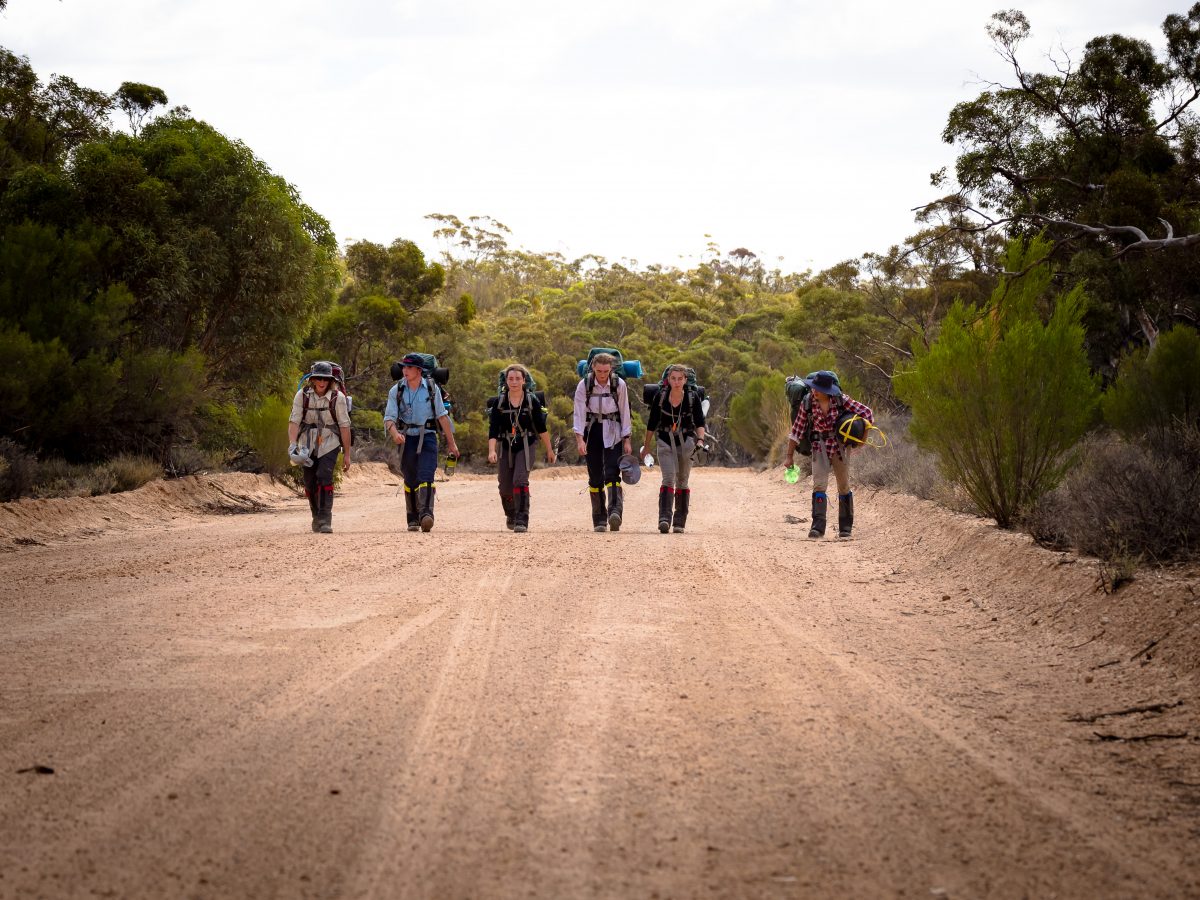Woodleigh’s Desert Challenge
Posted: 05 March 2019

In the first semester of Grade 10, pupils undertake a seven-day hiking trek across the Hattah desert some 550 kms from the school campus.
The trek has been running in some form for over 40 years and is part of a wider school Outdoor Education Program. The course enhances the academic program, assisting in developing good relationships between staff and students, building connections to and appreciation of the natural environment, and fostering independence, character and personality in all students.
The School advocates respect for self, others, and the environment and this programme brings together these values in quite a unique way in the sense that students need to own the behaviour that underpins those values and they need to own the consequences of those actions.
The trek also promotes self-sufficiency and independence. Students camp under the stars (no tents!) and are on their own for almost the entirety of the trip.
Author: Andrew Peach, Director of Outdoor Education
Planning
By Year 10, the students will have participated in many different forms of camping and outdoor activity challenges to prepare them for the demands of the trek. They will have gradually spent more time away from home, had opportunities to develop their independence, and enjoyed a variety of group tasks. In the first semesters of Year 7 and 8, we conduct Homestead Camps. One important aim of the Homestead Camps is to give students and staff the chance to practise living and working together as a small community. Homestead Camp weeks are also designed to help students develop a range of basic outdoor leisure skills in different environments. We employ outside experts with skills relevant to each Homestead’s program to work with staff in conducting challenging educational activities, which incorporate the development of leisure skills such as abseiling, orienteering, surfing and lightweight camping.
In Year 9 the students complete a challenging 9-day Outward Bound program along the Snowy River in Eastern Victoria. This program includes bushwalking, white water rafting, rock climbing, ropes courses and lightweight camping. The students are guided and supervised at all times by Woodleigh and Outward Bound staff.
In preparing for Hattah, the students undertake workshops covering first aid, navigation, nutrition and camp cooking, conflict resolution and group management, and environmental awareness to minimise their impact on the natural surroundings.
Activity
On an average day the kids will wake up having slept underneath the stars. They’ll begin early and get into their walking groups for the day, which are made-up of 5-7 students. They’ll plan their route moving through the park’s checkpoints to get from one camp site to another. Along the way, they are completely on their own. They decide the route they are going to take, they decide when they are going to have lunch, they decide who is going to lead, who’s going to navigate and how they are going to solve any problems they come across. Depending on how accurate they are with their navigation and how they choose to structure their day, the students are walking for 6 – 10 hours.
Behind the scenes, staff are on hand to support the students’ progress. There are lots of jobs to be done including moving and re-filling water stations and reviewing the checkpoints (‘vias’) once students have passed through them. Students are required to record on a note pad in the via how they are doing, arrival time, departure time and the bearing on which they are walking. This enables staff to have a fairly good idea of where the students are in the park and if they walk completely on the wrong bearing, we can find them or have an idea of where they will be. We employ a few outdoor specialists from an external organisation who are also ‘around.’ They can respond quickly to students in trouble as they are highly skilled in the Australian bush.
When the students reach camp, three walking groups will come together to camp for the evening. Staff and students camp overnight in the same general area (students are within calling distance or a short walk from staff) but staff try and give the students as much space as possible
During the evenings, staff catch up with the students face-to-face and check in with each of the smaller walk groups on how they are doing. This is usually in the form of a semi-structured group debrief. The debriefs provide an opportunity for the students to air anything they think they need additional support with and for staff to check on their well-being. Mostly, they are led by students with staff there prompting conversation when necessary or offering gentle support or advice.
Students also carry radios with them, in a taped-up lunchbox, which they can unravel and call upon staff in the event of a true emergency, that is beyond the capabilities of the students to be able to manage.
The main challenges for the students are coping with the harsh desert environment and negotiating with each other. It’s sandy, it can be hot, in can be windy, sometimes we can get rain: it’s an environment that when you’re here for the first couple of days, it’s very uncomfortable. The temperature can get up above 37 degrees Celsius and the navigation is difficult. There are few features in the landscape to judge location. The students must rely on their map reading skills and compass work in order to be accurate. All groups end up ‘lost’ at some point during the program. It is up to them to work it out, as a group, and get back on track. They have to take good care of themselves, staying hydrated and protecting themselves from the sun. Nutrition is also a challenge. They have to carry all of their food for the journey and there is no refrigeration. Careful planning is required and we encourage the students to dehydrate their own homecooked meals before they come on Hattah.
On one of the trek days the students get to canoe along the Murray River. This stretch is about 20 kms and gives them a chance to cool off and refresh themselves. They also have to learn new skills. Controlling a boat with a partner, when they are tired, can be very challenging.
Challenges
We are lucky that Hattah has been running for such a long time. It is an institution in the school and somewhat of a rite of passage. Families are very supportive and we often get parents of students who have completed the program to talk to parents of those about to undertake the journey. We have a dedicated team of staff who are involved, but succession planning is a challenge. It takes staff a couple of times around to truly understand and embrace the philosophy of the program and find the balance between supporting students and letting them learn through the experience. We have a very careful risk mitigation process that relies on training the students and an excellent communication network whilst on the program. It is always a challenge balancing the need to mitigate risk and meet health and safety requirements with allowing the students to explore, make mistakes and grow. We have had a few incidents over the years. However, our protocols, planning and highly competent staff and students have always been able to work through these issues and come out relatively unscathed.
Impact
When we drop the students off at the start of the programme, they’ve already done a lot of camping, but they still arrive looking like scared rabbits! Some of their packs are all shiny and new, their boots are clean, they’ve got this very serious, scared look in their eyes and as they’re walking off, they’re tottering a little bit side-to-side, stepping over the spinifex (spikey native grass) and burying their boots in the sand. But as they come into camp on that final day, they are just full of confidence. They’re walking strong with their packs on their back. Their navigation is good, they know exactly where they are going.
Mimi, Year 10: “It’s kind of scary at first because you think if something happens, no-one would be here. But it’s really good. It makes you really confident, it makes you trust yourself and it makes you listen to the navigation talks so that you don’t get lost.”
Chris, Year 10: “Once you’re out there and by yourselves you realise how much you need to trust and know where you’re going. Because you’re out there by yourselves, and you’ve got no teachers around, so if something happens, like you get bitten by a snake, you need to know what’s happening and know what to do. So, it’s a bit scary but it’s enjoyable in a way because you really gain from learning experiences by yourself rather than other people teaching you.”
Gretel: “It’s hard to do, to go into the morning and know there’s going to be a bit of struggle, a bit of pain and a bit of something you don’t like or didn’t want. But it’s then knowing you’ve reached the end of the day and seen all of that and been through all of that stuff that you didn’t like and still managed to have a good time.”
There’s so much that happens out at Hattah that we will never know or we will never see as teachers, which is really different from most other things that you do in the classroom or in outdoor education. The kids have to solve things for themselves out there. And how they go about solving that we will never know about and that’s much more like what life is like. You come across a problem, you negotiate, you solve it as a group and you move on and move through. Some of those things come up as a debrief in the evening but not everything.
One of the other strengths of the Hattah programme is the bonds that the kids form with each other. Whilst they have some input into the groups, we decide who they are going to go out there with. Often they will be with people in the group that they don’t usually hang out with at school.
They have to pick each other up when things are tough but they get to celebrate together when they make great achievements and a lot of the stories we get from our alumni are about the experiences they have had and the friendships they have formed.
Students complete a written reflection and evaluation at the end of the programme. Their experiences are also celebrated through presentations at assemblies and articles in the school magazine and newsletters. Students have also made short films about their Hattah experience to share with the rest of the school.
The future
Watch this space! There are very exciting things happening in the program in the near future which are being trialled in 2019.
Advice
- You don’t have to go far or anywhere particularly exotic to find adventure. Look at what is on your doorstep and utilise it. The objective is to give the students the skills and confidence to be able to pursue their OWN adventures, post-secondary school.
- Make sure you allocate enough time to prepare the students for the program. At Woodleigh, we start in ECC (Early Learning… pre-school) and things become more intensive from the end of term 4 in Year 9 through to the start of the program in Year 10.
- Make sure staff are 110% on board and committed. It is a big ask for teachers. There are no creature comforts for them either.
